On the Road is a weekday feature spotlighting reader photo submissions.
From the exotic to the familiar, whether you’re traveling or in your own backyard, we would love to see the world through your eyes.
JanieM
Jamie bargained with a cab driver to take us to the Great Wall at Mutianyu, an hour’s drive from Beijing. It cost about $50 for the round trip, including the driver waiting for us while we took in the sights.

The marker at the welcome plaza.
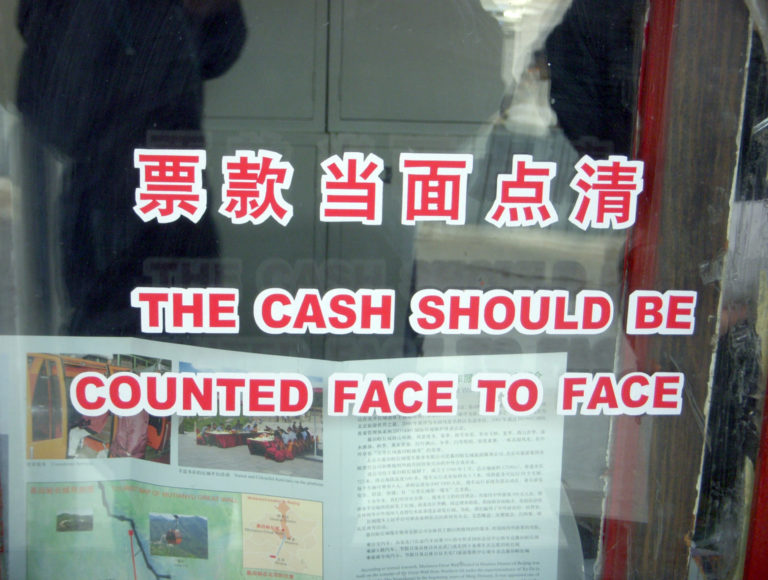
I collected funny English translations wherever I went. James Fallows, who lived in China for a few years, wrote some articles about translation in <i>The Atlantic</i> years ago that I found interesting and apt. Here’s one of them.
People in China told me more than once, and emphatically, that I was wrong about some aspect or other of English usage and syntax. These were folks who had been studying English since childhood and who were now students or professors in the English department of a university. To give credit where it’s due, some of them were very fluent – something I never accomplished with any of the foreign languages I studied.
On the other hand, I’m a native English speaker with a Ph.D. in English, and I’ve done copy editing as a sideline for a lot of my adult life. I thought I could be expected to know something about the language. But no. Certain people would ask me a question, then argue forcefully that they were right and I was wrong about patterns like this: “He’s arriving until three days.” Certain non-standard constructions were so common that it was like watching another version of English evolve before my eyes. Who’s going to argue with a billion and a half Chinese people!
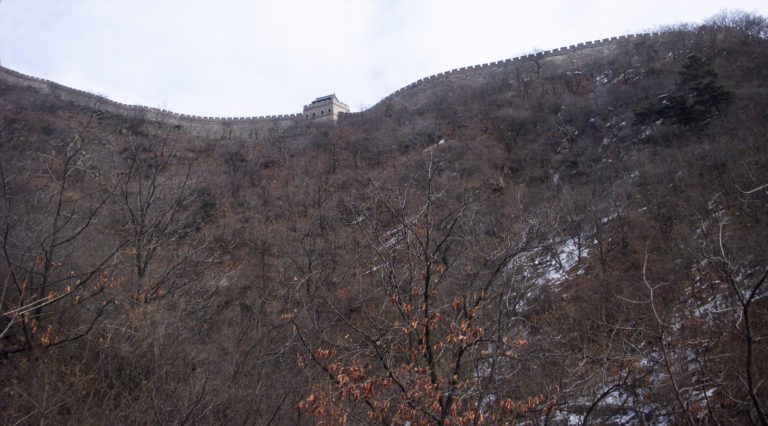
The view from below. Options for getting up there included a chairlift, a climb of 4000 steps, or our choice – a gondola.
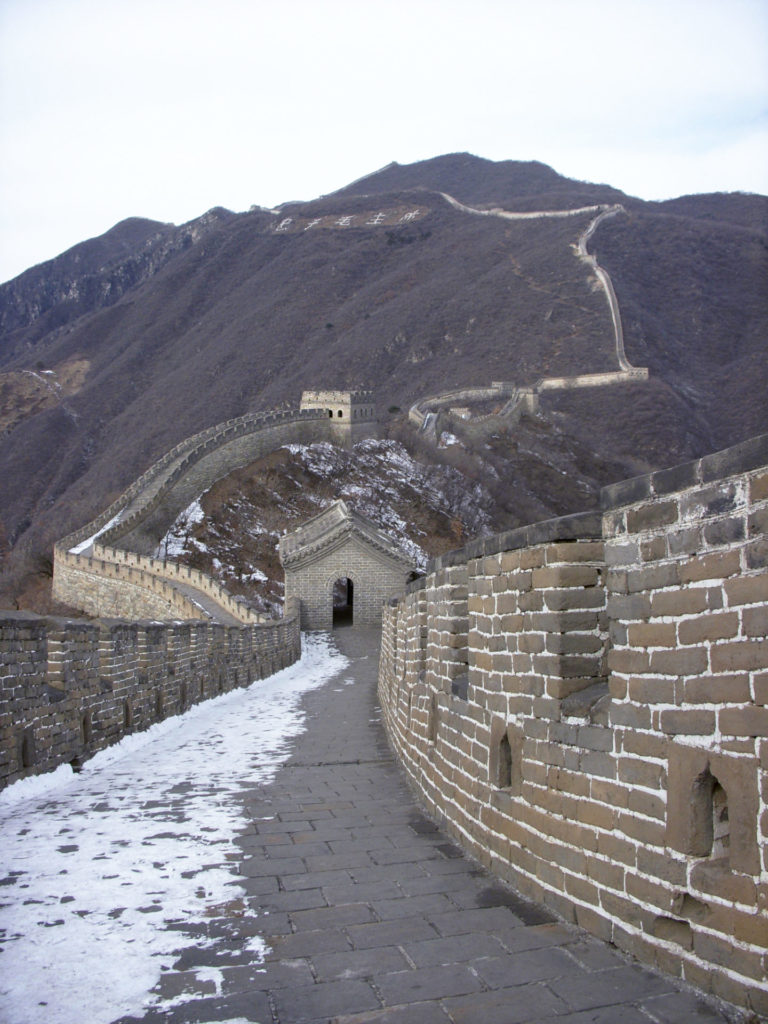
We had the wall mostly to ourselves for a couple of hours. Jamie quoted someone he met on a previous visit saying: “This isn’t the real wall, it’s an artist’s rendering.” I thought it was just an attempt to be clever, but I found out otherwise later.
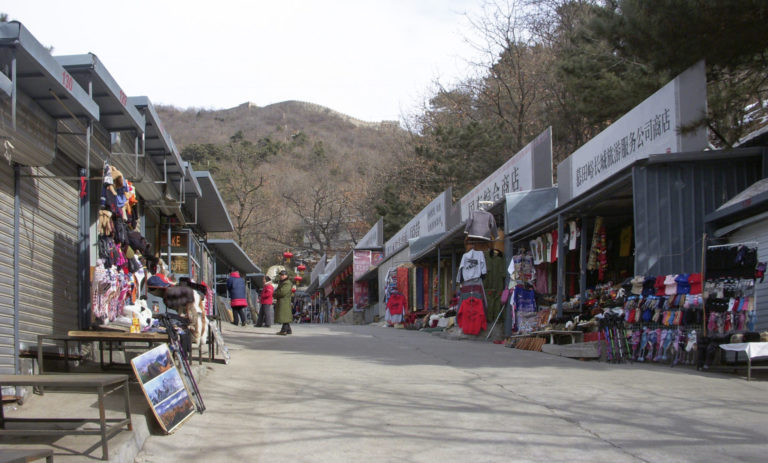
We took the gondola down and ran the gauntlet of the souvenir sellers, who were eager for customers on an uncrowded day in a slow season. Jamie knew what was coming and took my arm – I had only been in the country for a couple of days, I was still jet-lagged, and I couldn’t speak the language. His caution wasn’t unfounded. The vendors mobbed us, standing in our path, putting their hands on my free arm, and talking all at once, trying to get me to buy their wares. Their notions of personal space were quite different from mine, to put it politely.
Jamie wanted to get us through and out, but a blue hanging caught my eye, so I asked him to inquire about the price. When the vendor named the equivalent of about $23, we both automatically said no and started walking again. It was a cheap trinket. I didn’t want it that badly.
But the vendor made a counter-offer, and the game was on. She finally sold it to us for about $3.
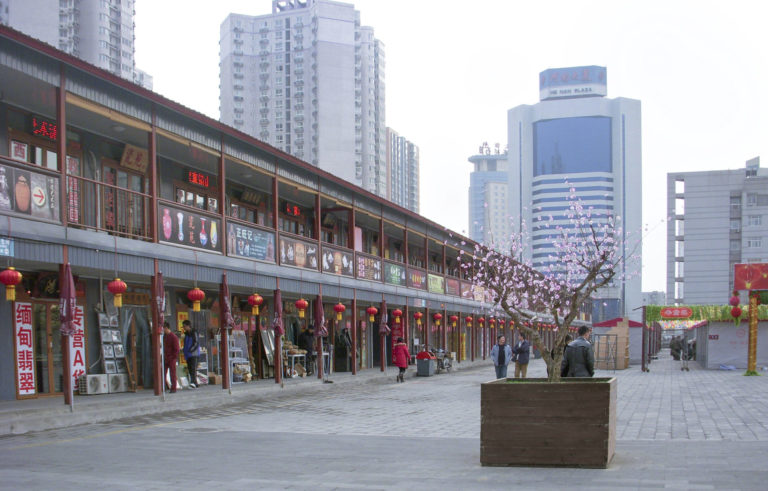
I had another adventure in bargaining at the antiques market. We went into a tiny secondhand bookshop, and I chose several volumes as souvenirs and gifts. I especially wanted an old paperback copy of Quotations from Chairman Mao for a friend who collects books.
The round-faced, white-haired man running the shop dickered over the prices for all the other books but stood firm at about $13 (IIRC) for the Little Red Book. Jamie wasn’t fond of bargaining, but he had been trying for a year and a half to learn to do it effectively, because in a lot of contexts in China you either bargain or get cheated. (See the previous story.) So he was half-kiddingly outraged that the bookseller’s wouldn’t play the game that he had been taught was obligatory. After several rounds with no movement on the price, he convinced me not to buy the book.
A couple of hours later, as we were preparing to leave the market, I said I wanted to go back and get the book for my friend. I mean, $13! I wanted the book more than I wanted to stand on (someone else’s) principle.
I went back alone. The bookseller gave me a sweet, knowing smile, and I gave him the money. My first five minutes alone in China went just fine!
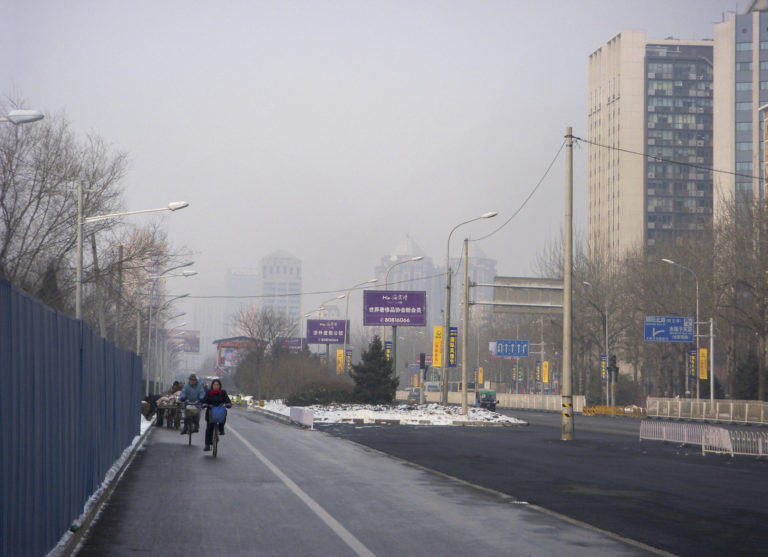
Another air quality sampler.
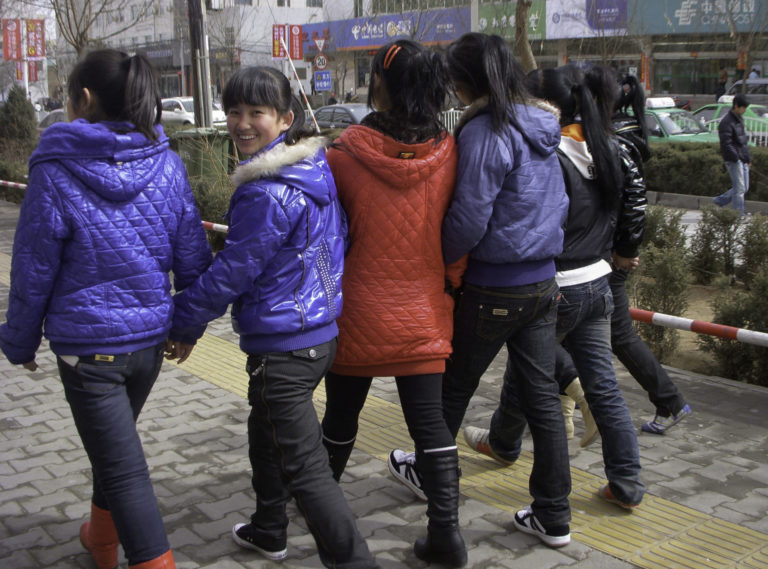
Despite the occasional hostile glare, many people were friendly, especially the younger ones. When I smiled, people usually smiled back. This was taken in downtown Yulin.

Robert Sneddon
Is that American English or British English you’re a native speaker of? But then again who’s going to argue with three hundred and thirty million American people.
Amir Khalid
@Robert Sneddon:
Just about every country in the world where English is widely spoken — Malaysia, Singapore, India, the Commonwealth countries in Africa etc. — had its own way of using English. Rather than one or two global standards, English seems to have a great many informal national standards. I can usually identify a fellow Malaysian’s English by its local idiosyncracies.
Laura Too
I love all the pictures, but the last one best, what a beautiful smile! I appreciate the narrative, thanks for sharing your experience.
Robert Sneddon
@Amir Khalid: We have Broad Scots here in Scotland, the glottal stop used in hand-to-hand combat and the BBC having to subtitle programs recorded on Glasgow’s[1] mean streets.
[1] Pronounced ‘Glesca’, just the way it’s spelled. See also Milngavie. Or Dalziel.
Elma
I don’t remember anyone glaring at us. People mostly wanted to get close and to take selfies with us on their smart phones. They especially wanted the tall white men, with full heads of white hair.
arrieve
I have a beautiful platter I got from a vendor outside the Summer Palace in Beijing. I looked at it, and quickly decided not to buy it, as I wasn’t sure how I could get it home. The vendor chased me as it started to rain and we were both running for shelter, and somehow we bargained while we were running and I bought the platter. Which I then held over my head to keep the rain off.
And somehow by wrapping it in all of my clothes and sticking it in the middle of the suitcase I got it home intact. I smile every time I look at it.
JanieM
@Amir Khalid: Yeah, I’m pretty sure Henry Higgins would be able to tell which suburb of Boston you came from by your accent, or for that matter which part of Maine (where I live). Tom Rowe, who’s gone now but was part of the Maine folk singing group Schooner Fare, used to do long silly jokes about Maine in the intervals between songs. One of his routines was to string seven or eight Maine accents in a row — this is Oxford County, this is Washington County, this is Androscoggin County, etc. It was amazing, first that there were so many, and secondly that he could make them clearly distinguishable.
JanieM
@arrieve: Congrats on the platter!
@Elma: No one paid us much attention in Beijing, but Yulin is much smaller and less…cosmopolitan. I don’t remember seeing another westerner there in my entire month’s visit, other than the handful of “foreign teachers” in the English department.
UncleEbeneezer
Haggling over prices in the markets of Vietnam/Cambodia was the one aspect of our trip I didn’t love. Prices were usually pretty fair even before any negotiations, and just knowing how little most of the vendors live on, I felt real douchey trying to talk them down on stuff. Also, I wasn’t real good at it. I needed a pair of sunglasses and heard that you can score Ray Bans (or similar, high end glasses) dirt cheap so I found some, negotiated and thought that I had gotten an incredible deal. When we got back to our room I saw that there were countless identical pairs on Ebay for the same price! :
PS great pix! Thanks for sharing.
JanieM
@Robert Sneddon:
@Amir Khalid:
I love that there are so many varieties of English. Something I think I wrote in an earlier post — one of the recurring themes of people I talked to in China was that Chinese is going to replace English as the world’s lingua franca any day now.
dnfree
@JanieM: after law school (in the late 1990s), my eldest daughter took a trip to India with some classmates, a couple of whom were from there. They wound up in some off-the-tourist-track places where people would rush up to my daughter (blonde with blue eyes) and just thrust their baby or small child into her arms so they could take a photo. The children were not always pleased.
dnfree
And again, thanks for sharing your photos. Some bring back memories of our 2008 trip, and others are new. So special that you were there to visit your son.
J R in WV
Wonderful stories, and yes, that last photo captures a great beautiful smile.
In Italy the souvenir sellers are pretty competitive also, and willing to dicker and bargain. In Florence on one of the plazas covered with souvenir stands packed with “Italian” fashion material, one guy holding a leather coat was especially persistent with Wife.
“I’ll sell this to you for half off — 50% — I’m nearly giving it away!!” he finally shouted, without ever being willing to tell us the price he was willing to take half of. What a deal~!!~
And like the big platter, how could you pack a full length leather coat into a suitcase already packed as tight as sardines?
Thanks for the great stories and pics!!!
JanieM
@UncleEbeneezer:
Yeah, I felt this way a lot too. We ate delicious breakfasts at tiny shops for the equivalent of about a dollar — almost everything was incredibly cheap for me on even a modest American budget. Big topic.
A woman from anywhere (formerly Mohagan)
@UncleEbeneezer: That reminds me of our trip to Tanzania, where we went to a Maasai women’s handicraft sale area, which was just a large circle of tables, with the women lounging on the grass behind their tables, and we Americans circling the tables, picking up whatever we wanted to buy. After we had made our selections, we all met under a tree in the middle of the circle, and a Maasai male (who was hired by the tour company) was there to translate and help us bargain for the pieces. The first American up was a male, who, as instructed, bargained for his handmade beaded pieces. Everyone else who wanted to buy was a woman who didn’t want to bargain, and we women quickly decided since the Maasai are quite patriarchal and that the women got to keep all the money they made, we would just pay what they were asking for the pieces (still incredibly cheap by American standards). It was a sisterhood thing – giving these women some power in their relationship with their husband. Tanzania is a very poor country and this was not at a tourist bazaar, but out in the country.
Although we heard some very harsh stories about the situation of women in Maasai culture, I also met a Maasai man at a very nice eco-farm we stayed at who worked at the resort both as a birding guide and as a masseuse, who said he was working there on these side gigs in order to pay for his daughter’s schooling (schooling is not free in Tanzania).